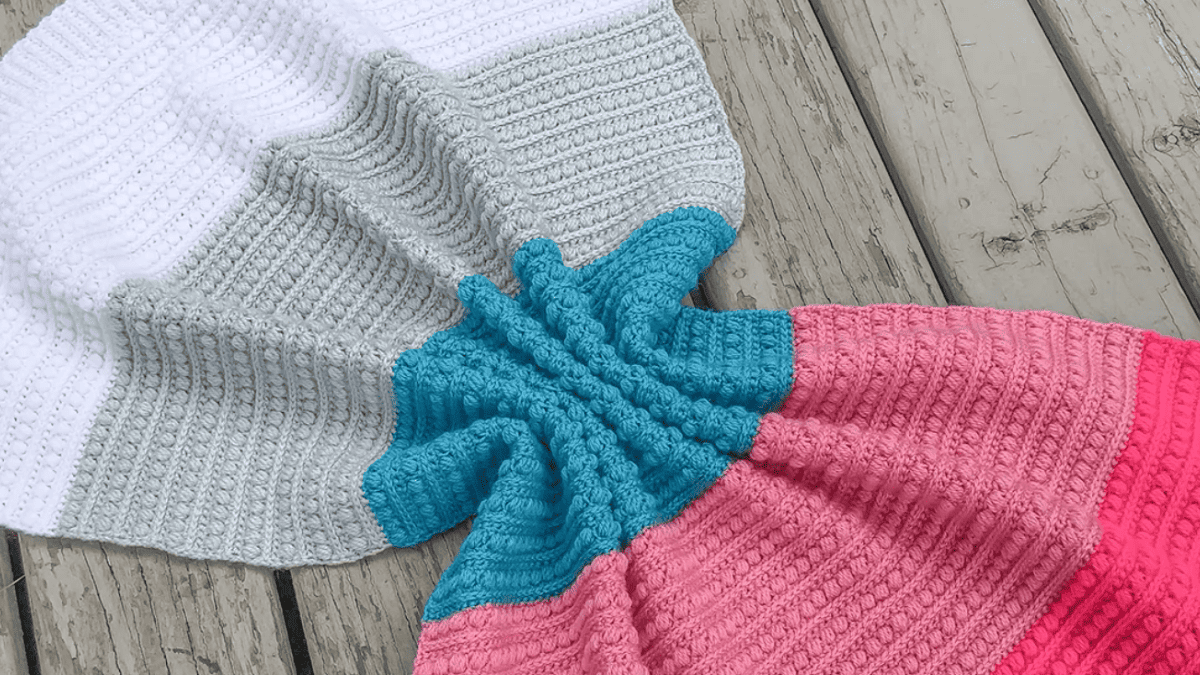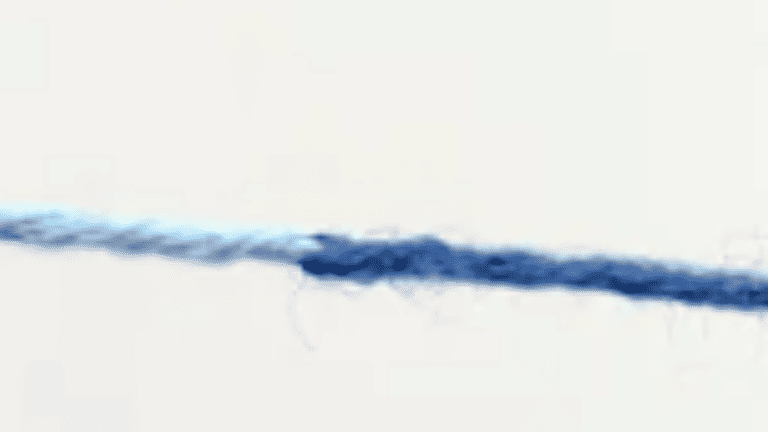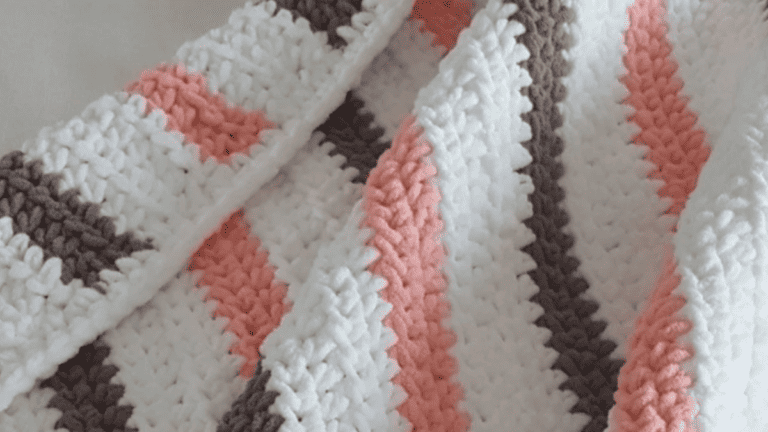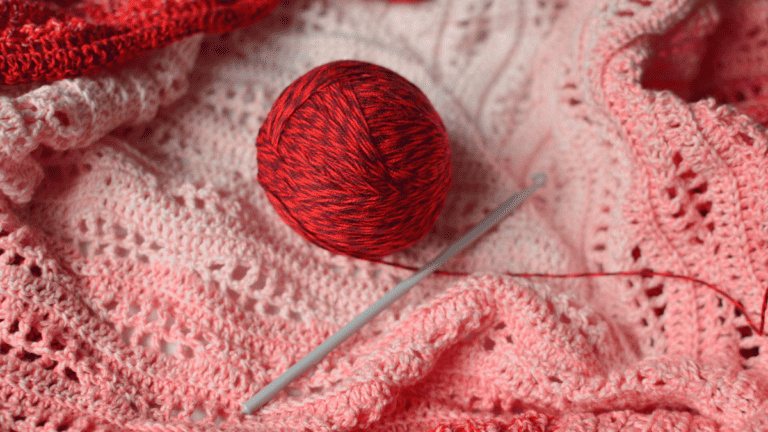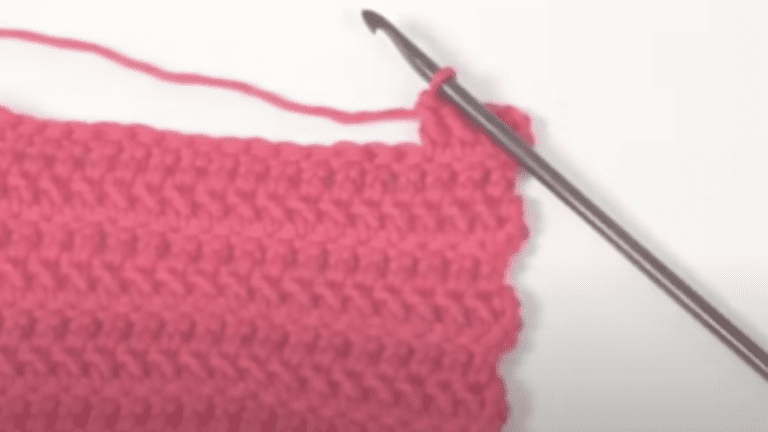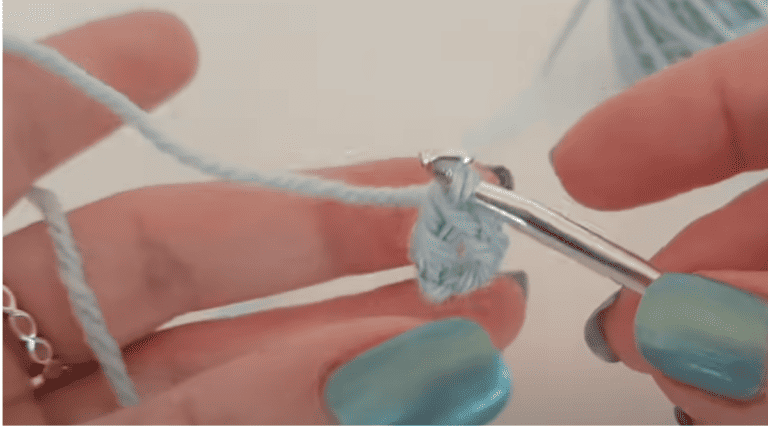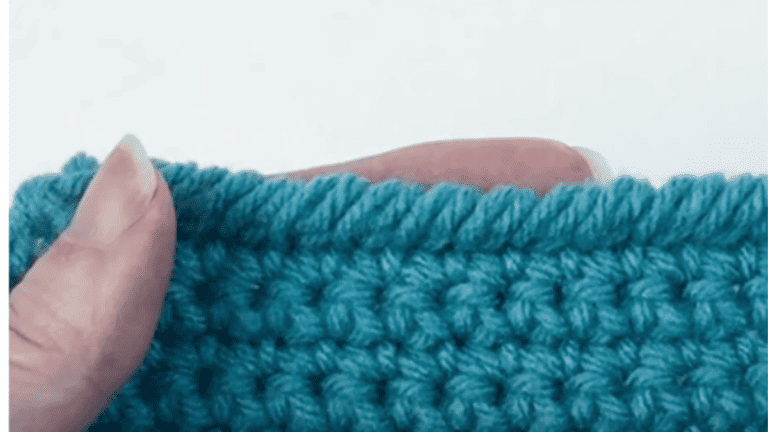Best Yarn For Crochet Blankets: Easy Beginner Guide
Choosing the best yarn for crochet blankets can feel like a big decision, one that determines both the ease of crocheting and the comfort level of the finished product.
You want something that feels delightful to work with and will hold up well over time, providing warmth and coziness. With so many options available, it can be overwhelming to select the perfect yarn. Today we are talking about the best yarn for crochet blankets.
Yarn weight is a key aspect to think about because it affects the drape and thickness of your blanket. Lighter weights, like DK or sport, will produce a thinner blanket perfect for spring or fall, while bulky or super bulky yarns are ideal for a plush, warm winter throw.
Moreover, the fiber content dramatically influences how your blanket feels and how easy it is to care for. Acrylic yarns are durable and easy to wash, making them a practical choice for baby blankets or daily use throws.
On the other hand, wool or wool blends offer superior warmth and a luxurious feel but might require more careful washing.
In addition to weight and fiber content, color selection is also a vital part of the process. Whether you prefer bold and vibrant colors or subtle and soothing hues, the color of your yarn will set the mood for your crafting journey and the final ambiance of any room where the blanket is displayed.
Yarns that come in a wide range of shades allow you the freedom to customize your blanket to match your personal style or the intended recipient’s taste. Keep these considerations in mind, and you’ll be well on your way to creating a crochet blanket that’s as unique as you are.
Table of Contents
Yarn Weights
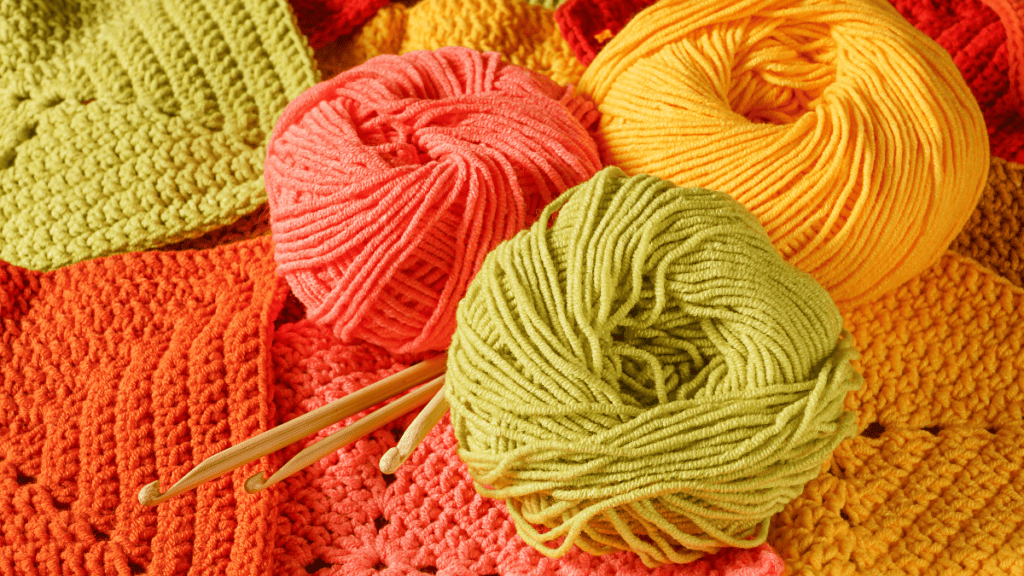
When picking out yarn for your crochet blanket, you’ve got a lot of options. Yarn weight refers to the thickness of the yarn strand and is a crucial factor in your project’s final feel and look. Here’s a quick guide:
- Lace Weight: Super fine and delicate, best for airy, intricate patterns.
- Fingering Weight: Slightly thicker than lace, good for lightweight blankets.
- Sport Weight: A middle-of-the-road choice that offers a good balance.
- Worsted Weight: Probably the most common; it’s versatile and easy to work with.
- Bulky Weight: For when you want something cozy and quick to work up.
- Super Bulky Weight: Think speedy projects and seriously snuggly blankets.
Now, types of yarn can vary in material, which affects texture and warmth:
- Cotton: Breathable and easy to clean; ideal for summer blankets.
- Wool: Warm and soft; perfect for colder months but requires more care.
- Acrylic: A synthetic substitute; durable, affordable, and hypoallergenic.
- Blend: Combines fibers to get the best of both worlds.
Remember, each weight works up differently, so consider the stitch pattern and blanket size you’re aiming for. Your choice will impact the drape and warmth of your finished blanket. Feel the yarn, look at the colors available, and have fun combining weights and types for unique effects. Happy crocheting!
Best Yarn For Crochet Blankets
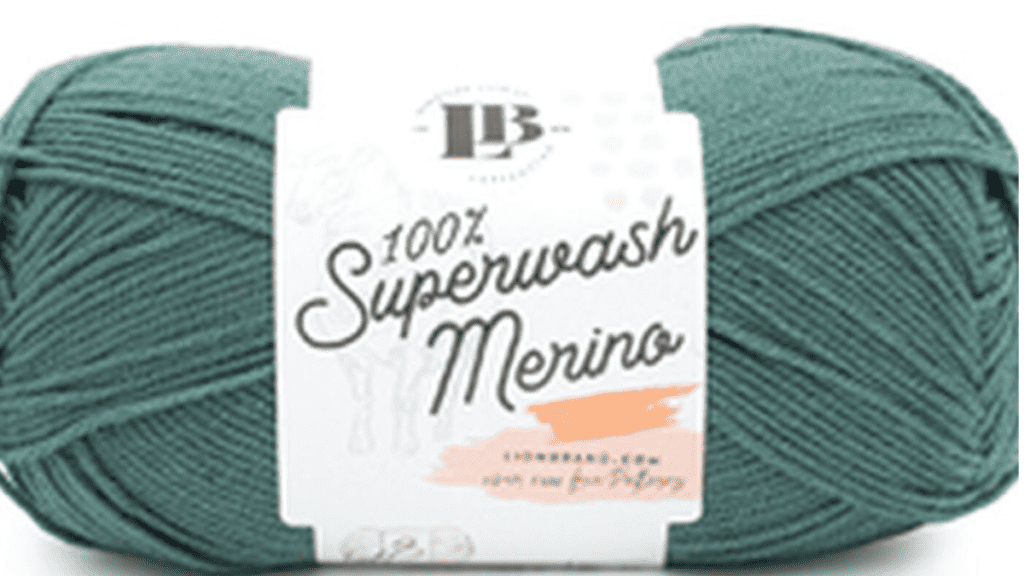
When you’re on the hunt for the perfect yarn for your crochet blanket, you want something that feels great, is durable, and easy to work with.
Your choice will majorly influence the texture, warmth, and overall look of the finished blanket. We are diving into the differences including Arcylic yarn, wool yarn, and cotton yarn. All 3 are a popular choice when it comes to the best yarn for crochet blankets.
Acrylic Yarn: Affordable and Easy to Maintain
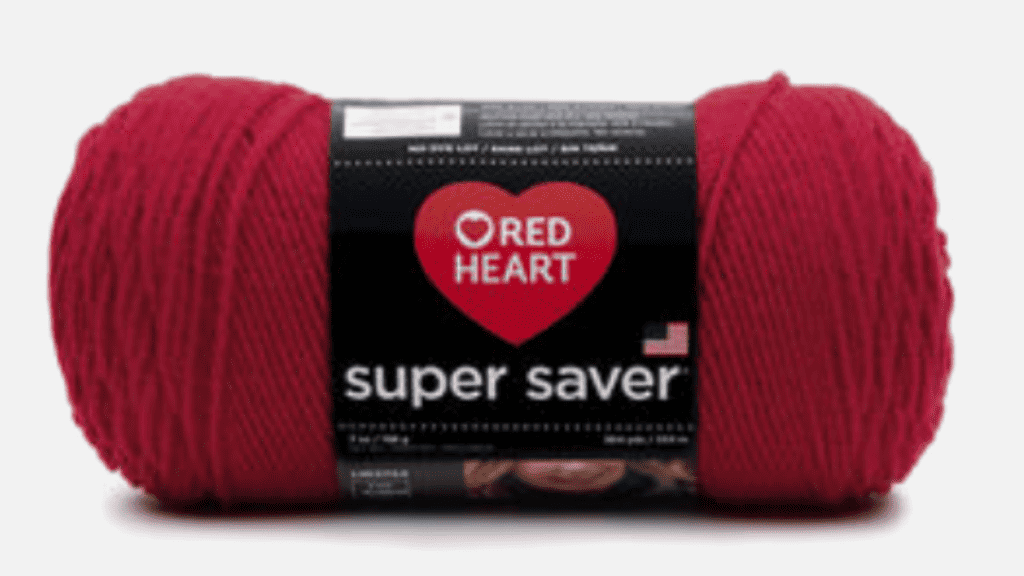
Check Prices: Acrylic Yarn
Acrylic yarn is your go-to for an affordable and low-maintenance option. It’s lightweight and comes in a variety of colors. Plus, it’s easy to wash, which is a bonus if your blanket is going to be getting a lot of use.
- Yarn Weight: Ideal for any weight, from lightweight for spring blankets to bulky for the coldest winter nights.
- Maintenance: Most are machine washable and dryable.
Wool Yarn: Warmth and Durability
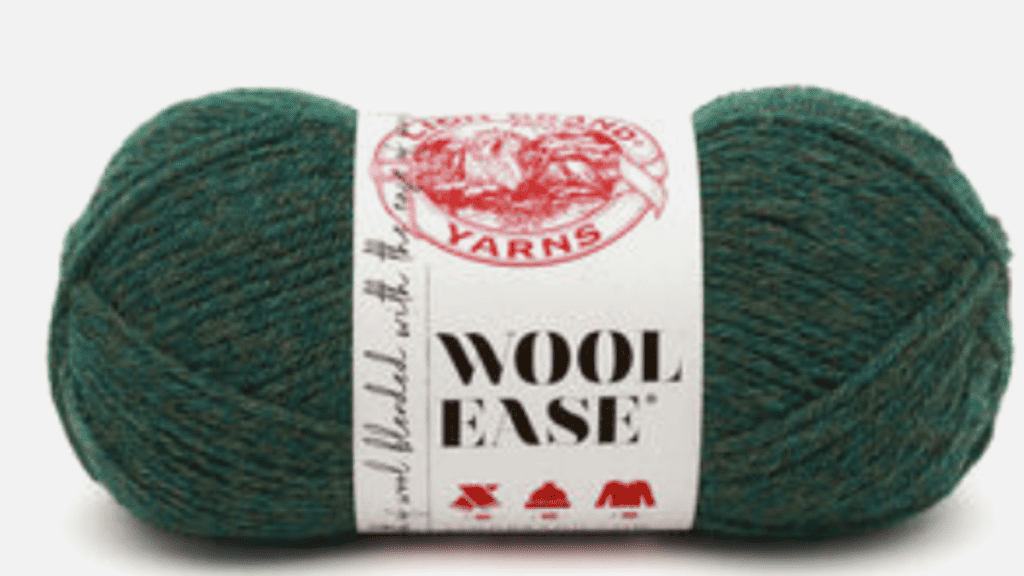
Check Prices: Wool yarn
Wool yarn brings warmth and durability. It’s a natural fiber beloved for its insulating properties and it’s naturally moisture-wicking, keeping you cozy without overheating.
- Yarn Weight: Typically found in medium to bulky weights.
- Care Tips: Hand wash or use a gentle cycle to maintain quality.
Cotton Yarn: Softness and Versatility
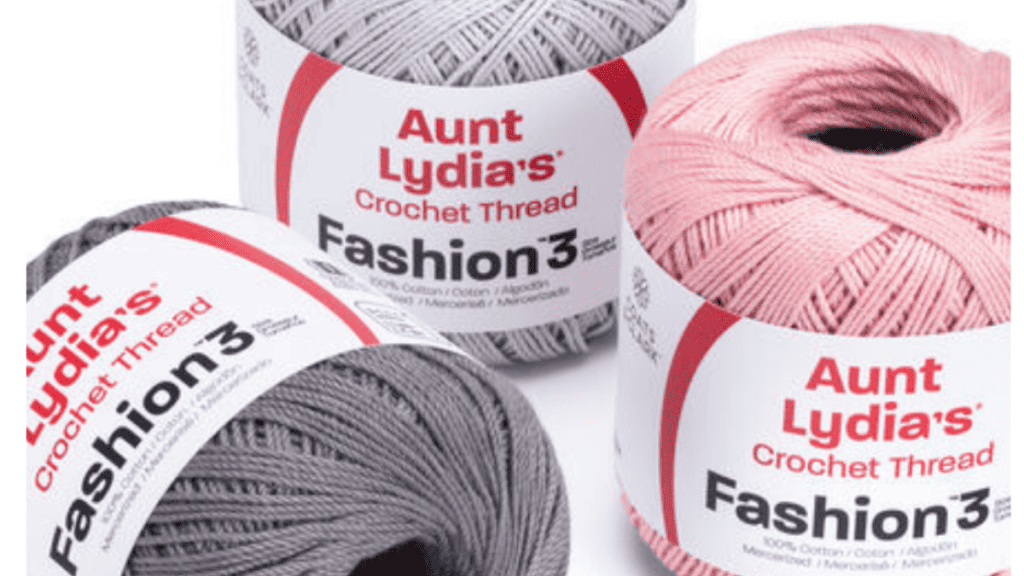
Check Prices: Cotton yarn
For a blanket that feels soft against the skin and is versatile enough for year-round use, reach for cotton yarn. It’s breathable and generally good for people with allergies, as it’s less likely to irritate.
- Yarn Weight: Works well in light to medium weights.
- Pros: Cotton is easy to maintain and great for a soft drape.
Natural vs Synthetic Fibers
You’ve got a choice between natural fibers and synthetic fibers. Your pick influences your blanket’s feel, longevity, and care needs. Natural fibers, like wool and cotton, are renewable and biodegradable, whereas synthetics, like acrylic, offer vibrant colors and easy care.
- Natural Fibers: Tend to be more breathable and sustainable.
- Synthetic Fibers: Often more affordable and less prone to shrinking.
Specialty Yarn: Chunky, Bulky, and Novelty

For a statement piece, turn to specialty yarns like chunky, bulky, or novelty yarns. Think chenille yarn for a velvety feel or a cool novelty yarn to add texture and interest.
- Chunky/Bulky Yarn: Great for a quick project with a cozy, plush result.
- Novelty Yarn: For an unique touch, though sometimes trickier to work with.
Factors to Consider When Choosing Yarn
When it comes to creating a cozy blanket, the yarn you choose is as crucial as the pattern. Comfort, visual appeal, functionality, and care all intersect in the yarn aisles.
Softness and Comfort
The softness of the yarn determines your blanket’s comfort level. You’ll want to look for the softest yarn that can withstand regular use.
- Acrylic yarns can be incredibly soft and are a staple for many crafters.
- Cotton and bamboo yarns offer a natural softness suitable for more temperate climates.
Color and Dye Lots
Consistency in color across your skeins of yarn is vital to a uniform look. Aim for yarn from the same dye lot.
- If you’re working with different colors, check that each color is from the same dye lot.
- Color options are plentiful, so select a palette that matches your style and décor.
Weight and Thickness
The weight and thickness of your yarn affect the texture and warmth of your blanket.
- Choose thicker yarns for a heavier, warmer blanket perfect for cold nights.
- Lighter weight yarns are better for lighter, airy blankets.
Fiber Content and Sensitivity Issues
You’ll need to consider the fiber content, especially if you have sensitive skin.
- Wool is warm but can be irritating to sensitive skin; opt for a soft wool blend or hypoallergenic options.
- Synthetic fibers like acrylic are generally safe for sensitive skin and are easy to maintain.
Care Instructions and Durability
The ease of care is a practical aspect not to be overlooked. Check if the yarn is machine washable.
- Ensure the yarn can be cleaned easily, preferably in a washing machine, if you’re aiming for low maintenance.
- Fiber content also plays a role in durability, so choose one that can handle wear and tear.
Yarn Recommendations for Different Types of Projects
Choosing the right yarn for your crochet blanket project significantly affects the outcome. Factors such as the recipient, project size, and your experience level will guide your selection.
Crochet Baby Blankets: Safety and Softness
For baby blankets, your top priority is selecting yarn that’s soft and safe for a baby’s sensitive skin. Caron Cotton Cakes provide a gentle touch with an acrylic blend that’s easy to wash – a must-have feature for baby items. An ideal choice would be a worsted weight yarn as it’s thick enough to be warm but not too bulky for little ones.
- Recommended Yarn: Caron Cotton Cakes, Worsted Weight Acrylic Blend
- Attributes: Soft, Hypoallergenic, Machine Washable
Large Crochet Blankets
Large projects, like full-sized blankets, mean more yarn and time. Acrylic blends are economical and durable, making them suitable for blankets that will see a lot of use. While a chunkier yarn can speed up your project, consider if the added weight suits your needs.
- Recommended Yarn: Bulk Acrylic Blend, Chunky or Worsted Weight
- Considerations: Cost-effectiveness, Time Investment, End-use
Beginner Crochet Blanket
If you’re a beginner crocheter, opt for yarns that are easy to work with and show stitches clearly. Worsted weight yarns are generally recommended for those new to crochet, as they are not too fine or too bulky, making your stitches easy to see and your tension easier to manage. Many free patterns suggest this weight to help you practice.
- Recommended Yarn: Medium Worsted Weight Yarn
- Features: Good Stitch Definition, Manageable Thickness
Crochet Blanket Yardage
When you’re planning to crochet a blanket, knowing how much yarn you’ll need is crucial to ensure that you have enough material from the start to complete your project.
Estimating Yardage
To estimate the yardage for your crochet blanket, start by considering the size of the blanket you’re aiming to make. A small baby blanket may require only about 1000 yards, whereas a large throw can easily demand 4000 yards or more. A simple way to estimate is:
- Baby Blanket (30″ x 35″): 1000 – 1500 yards
- Lapghan (36″ x 48″): 1500 – 2000 yards
- Throw (52″ x 60″): 2000 – 3000 yards
- Twin (59″ x 85″): 3000 – 4000 yards
- Queen (90″ x 90″): 4000 – 5000 yards
- King (108″ x 90″): 5000 – 6000 yards
How To Read a Yarn Label
Yarn labels are your best friends when calculating yarn quantity. Every yarn label contains critical information, including the yardage per skein. Look for a number followed by “yd” or “m” which indicates yards or meters, respectively. For example, if a label says “200 yd / 183 m” and you’ve estimated you need 3000 yards, you’ll require about 15 skeins of that yarn (3000 yards / 200 yards per skein).
Crochet Basics
When creating a crochet blanket, your choice of hook, stitch, and yarn consistency are pivotal factors that determine the blanket’s quality and aesthetic.
Choosing the Right Crochet Hooks
Your crochet hooks can make or break the crochet experience. For blanket projects, ergonomic hooks that fit comfortably in your hand will help you crochet longer without discomfort. Size matters, too. The yarn label typically suggests an appropriate hook size; however, if you’re going for a looser drape, you might want to size up.
- Aluminum hooks glide smoothly for speed.
- Bamboo or wooden hooks offer a cozy grip and prevent yarn from slipping too much.
Crochet Stitch Types
Different stitches bring out unique textures and styles in your blanket. For great stitch definition, opt for smooth yarns that allow stitches like cables and popcorns to pop. Here are a couple of points to keep in mind:
- Tight stitches like single crochet work well with sturdier yarns.
- Loose stitches like trebles are stunning with softer, drapey yarns.
Picking the right yarn for your stitch can also affect the type of project you’re working on, whether it be a summer throw or a winter warmer.
Best Crochet Yarns for Blankets
When you’re on the hunt for the perfect yarn for your crochet blankets, knowing about popular brands and their product lines is crucial. Here’s a look at some of the most well-known names and what they offer.
Bernat Blanket Yarn
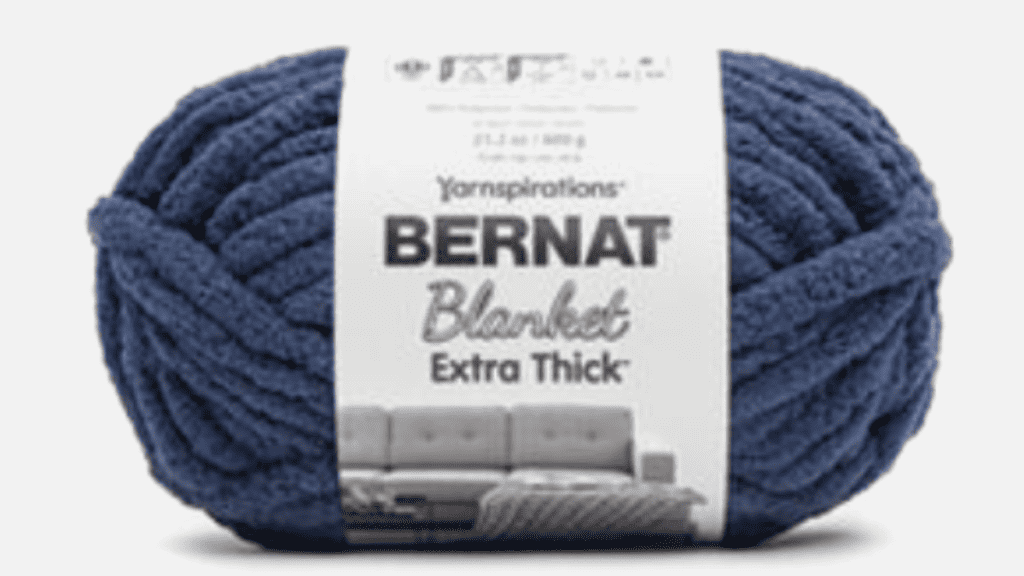
Check Prices: Bernat Yarn
Bernat is renowned for its Blanket Yarn, a bulky, soft choice famous for its coziness and ease of use. This chenille-style yarn is ideal for quick blanket projects and comes in a range of varieties, including:
- Bernat Baby Blanket Yarn: Super soft and perfect for baby items.
- Bernat Blanket Brights: Bold, vibrant colors that make a statement.
Each variety of Bernat Blanket Yarn is crafted to bring warmth and comfort to your creations.
Lion Brand
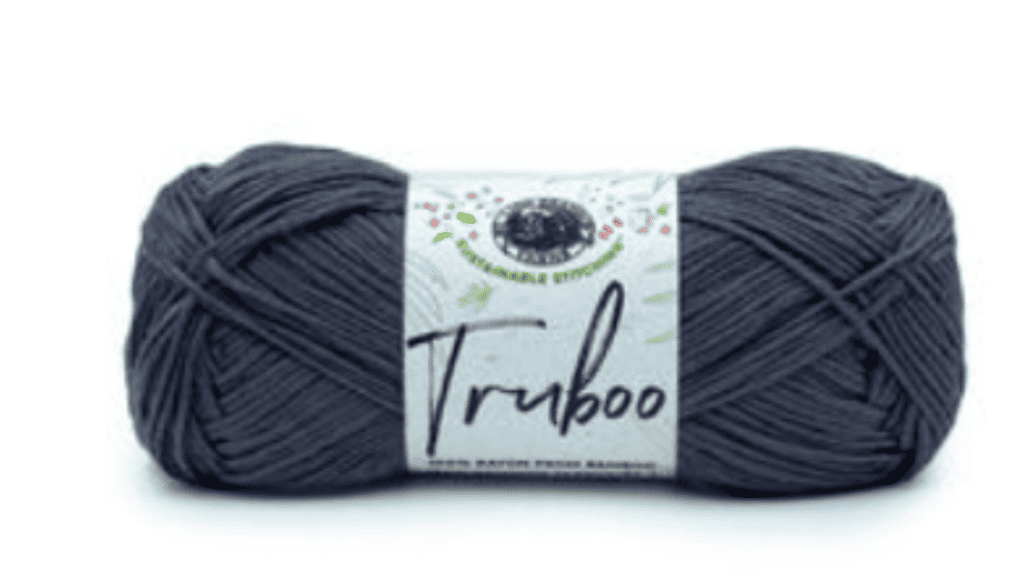
Check Prices: Lion Yarn
Lion Brand Yarn has been a favorite for generations of crocheters. They offer a wide range of textures and colors catering to any project you might have in mind. Their popular lines include:
- Lion Brand Wool-Ease Thick & Quick: A super bulky member of the Wool-Ease family, great for warm blankets.
- Lion Brand Homespun: Soft and textured, producing a lovely draped effect.
These yarns are praised for their quality and versatility in crochet blanket making.
Red Heart

Check Prices: Lion Heart
Finally, Red Heart yarns are beloved for their diversity and affordability. With a plethora of choices, you’re sure to find a yarn that fits your taste and budget. Some of the standout selections are:
- Red Heart Super Saver: An all-purpose, worsted-weight yarn that’s both economical and sturdy.
- Red Heart Soft: A remarkably soft yarn that works up beautifully for a cozy feel.
Their varied textures and weights make Red Heart a go-to brand for many crocheters.
Crochet Blanket For Beginners
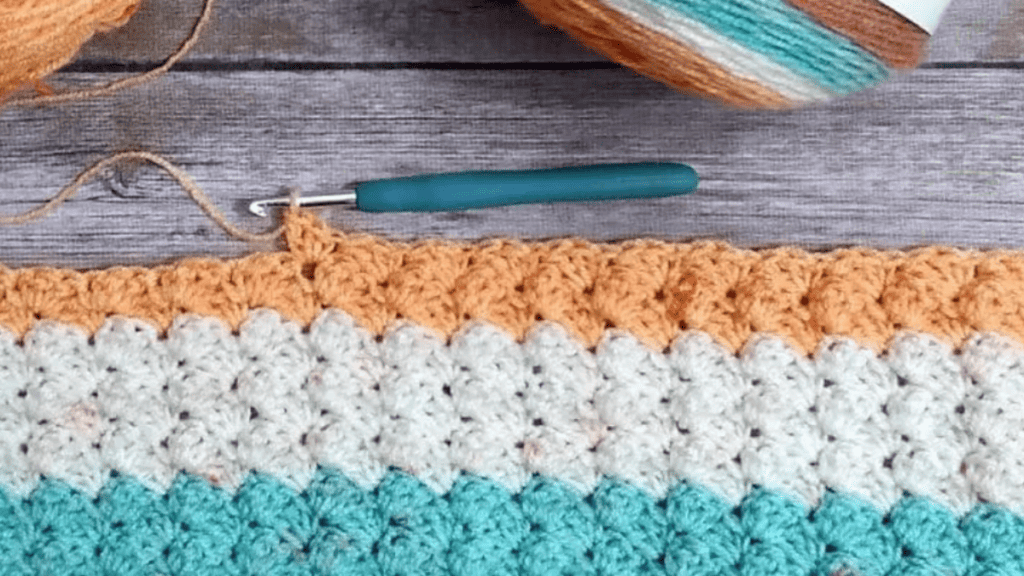
If you’re diving into your first crochet blanket, take a deep breath—you’ve totally got this. Let’s break down a few golden rules for making your crafting journey a joyful one.
Start Simple: As a beginner crocheter, picking an easy pattern can boost your confidence. Look for terms like beginner-friendly or simple stitch during your pattern hunt.
Yarn Choice: A medium-weight yarn (like worsted) is your BFF. It’s forgiving of mistakes and easy to handle. Light colors can also help you see your stitches more clearly.
Crochet Hook: Make sure your hook is a good match for your yarn. There’s usually a suggested hook size on the yarn label—stick to it to avoid too tight or too loose stitches.
Swatch It Up: Try making a small test piece (a swatch) before you begin the blanket. It’s a good idea to get a feel for the stitch and check your gauge.
Stitch Markers Use stitch markers to mark your starting point for each row. You can use anything from fancy markers to a piece of contrasting yarn.
Final Thoughts on Choosing the Perfect Yarn
When you’re on the hunt for the best yarn to craft your crochet blankets, remember that the “perfect yarn” is subjective and hinges on your individual project needs. It’s about striking a balance between comfort, durability, and the joy of your crafting experience.
Yarn Materials: Natural fibers like wool and cotton are a great choice for their warmth and breathability. If you’re looking for something easier on the wallet, acrylic yarns are a good choice and offer a wide range of colors.
Yarn Weight: Thicker yarns work up quickly and give your blanket heft, which is excellent for the cozy factor. A worsted or bulky yarn could become your go-to for a satisfyingly speedy project.
- Lighter weight yarns: They might take longer to work up but can be a great option for detailed stitch patterns.
Care Instructions: Easy care is crucial for items like blankets. Some yarns are machine washable, which makes them an excellent choice if your blanket will see frequent use.
Softness: If you’re going for the snuggle factor, softness is key. Test the yarn against your skin to make sure it’s gentle enough for your liking.
Colorfastness: No one wants their hard work to fade away. Make sure your perfect yarn is colorfast, especially for blankets that will be washed often.
Here’s a simple breakdown to recap your best bets:
| Feature | Your Best Choice |
|---|---|
| Durability | Acrylic, Wool |
| Softness | Chenille, Cotton |
| Ease of Care | Machine-washable Yarns |
| Budget-Friendly | Acrylic |
| Warmth | Wool, Blends |
Remember, your perfect yarn is one that aligns with your expectations for the finished blanket and your personal preferences in the crochet process. Happy hooking!
Crochet Baby Blanket Patterns
Here are our favorite crochet baby blanket patterns. Simply find the perfect pattern for your skill level.
